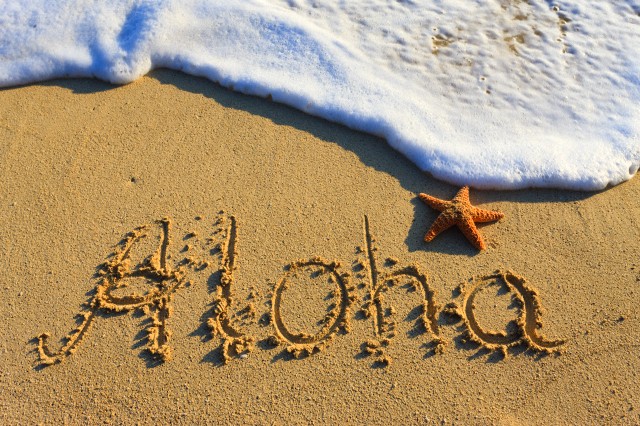| By: Paul S. Cilwa | Viewed: 7/27/2024 Posted: 5/1/2010 |
Page Views: 1781 | |
| Topics: #Hawaii #Linguistics #Travel | |||
| How to pronounce those wiki-wacky words of our 50th state. | |||

No one started out with more trouble pronouncing Hawaiian words than I did. On my first trip, to Maui last year, I had spent two days on Mount Haleakala before I could pronounce it properly (hollay ah kah la). Last week's trip to Kauai wasn't much easier. True, most of us have heard Waimea often enough to remember how it's said (why MAY ah) But then there's towns like Kapa'a (coppa ah) and Po'ipu (poh IH poo). And what's with the apostrophe? What got left out? (Often, it's the apostrophe: You'll see as many signs with "Poipu" as with "Po'ipu".) So today I thought I'd research the topic a little and share what I've learned.
The original Hawaiians spoke Hawaiian exclusively, of course. Their language came mostly from Tahiti and the Marquesas around 300 CE and evolved independently once the original colonists found themselves isolated from their homeland. But other groups stumbled on the islands from time to time, notably from Samoa/Tonga and the Society Islands; and they brought their words with them, which became incorporated into the Hawaiian language as well.
Hawaiian words sound long and repetitive to English speakers' ears. That's because Hawaiian contains fewer sounds than English, and therefore needs to chain them together in longer words in order to maintain the same size vocabulary. So, for example, we have the name of King Kamehameha, or the state fish, the Humuhumunukunuku apu'a'a. But time and exposure to these words will gradually grant familiarity to the ear.
Hawaiians did not write their language prior to the arrival of the Europeans; their history and culture was transmitted via stories and the hula, a dance consisting of meaningful body movements. The first words in Hawaiian to be written down, were written phonetically by Captain Cook in his 1778 ship's log. People weren't rigid about their spelling in those days, anyway. He wrote it as "Owhyhee" or "Owhyee". It turned out the inital "O" sound was actually Hawaiian for "This is". Once that was understood, the O was dropped and spellings similar to "Whyhee" were used.
But once the islands were discovered, missionary fervor built rapidly and a Hawaiian written language was essential in order to translate the Bible so it could be taught to the islanders. This conversion was performed by learned churchmen, who naturally used the Latin alphabet and pronunciations in their transliterations. That's why the "ai" in Hawaii sounds like "eye" and an "i" by itself is pronounced "ee".
The written Hawaiian language was quickly adopted by the locals, though, who immediately saw its practicality—especially since the missionaries forbade the dancing of the hula, under pain of death. And once the Hawaiians became literate, they immediately began printing their own newspapers. In the 115 year period between 1834 to 1948, the years spanning the Republic of Hawai'i and its forcible inclusion into the United States as a "territory", Hawaiian language newspapers were published and distributed to almost every one of the main inhabited islands—and this is despite the fact that schoolchildren were punished with beatings if they spoke Hawaiian in school.
Hawaiian has only seven vowel sounds, and the transliteration into Latin made use of five vowels and two diphthongs.
| Letter | Pronunciation |
|---|---|
| a | "a" as in "father" |
| e | "ay" as in "say" |
| i | "i" as in "ski" |
| o | "o" as in "go" |
| u | "u" as in "rue" |
| ai | "y" as in "sky" |
| au | "ow" as in "frown" |
Hawaiian has very few consonants, which is why their words sound so vowel-heavy. That's why, when English words (like "Merry Christmas") are pronounced in Hawaiian, they come out so different ("Mele Kalikimaka"). But Hawaiian consonants move easily into English, with two exceptions.
One is W, which is properly pronounced as a cross between V and W. (That's why you sometimes hear the name of the state pronounced "Ha Vye Eee".) This is a hard sound for English speakers to hear, let alone pronounce, because it simply isn't a part of our language.
The second is a sound we don't even have a letter for. It's called a "glottal stop", and is the sound we make between syllables when we say, "uh-uh." There is no standardization on what character to use for this consonant, but it generally looks pretty much like an apostrophe. So that's why you see the name of the state or the Big Island spelt. "Hawai'i".
Because the consonant is so unusual in English, it's often simply omitted from signage. So you might see "Poipu" or "Po'ipu". But included or not on signs, the glottal stop is a part of the word. And, by the way, the "oi" diphthong pronounced as in "oil" does not exist in Hawaiian. Though to English ears "poi", the bland staple food made from the taro plant, may sound like "poy" (rhyming with "boy") it is actually "po-ih" with the two syllables running together, as would be expected with any commonly used word. So the town is "Poh IH poo", never "poy poo".
Lots of Hawaiian words end with a double vowel (with or without the glottal stop) and both are pronounced. So, it's "Ha WY ee", never "Ha WY". The town Kapa'a or Kapaa is pronounced "Kap ah ah".
And the state fish? Break it up: Humuhumunukunuku apu'a'a is pronounced "Hoo moo hoo moo noo koo noo koo ah poo ah ah".
If you're still having trouble, just order the mahi-mahi.





